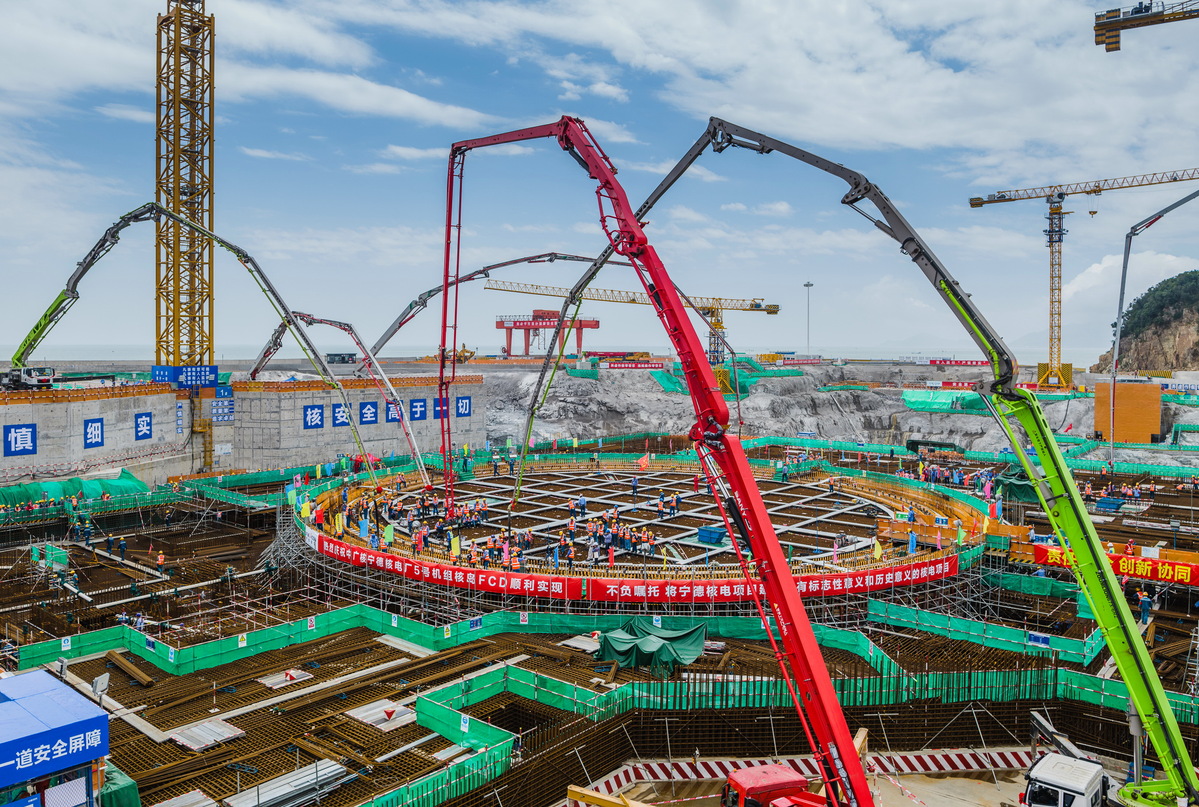
 0 Comment(s)
0 Comment(s) Print
Print E-mail China Daily, September 11, 2024
E-mail China Daily, September 11, 2024

Aerial view of a nuclear power station under construction in Ningde, Fujian province, in July. [Photo/Xinhua]
China has achieved significant strides in nuclear power development in recent years, rapidly expanding the industry and establishing a comprehensive nuclear power supply chain, positioning itself as a global leader in the sector.
Over the past decade, China has experienced rapid growth in nuclear power, developing substantial expertise and engineering capabilities in nuclear technology research and development, engineering design, equipment manufacturing, and construction operations, said Zhang Jianhua, head of China's National Energy Administration.
"After 40 years of exploration and practice, China has established a comprehensive industrial system, making it one of the few countries in the world with a complete nuclear power industry system," said Zhang. "Nuclear power has become a critical and primary energy source for the eastern coastal regions, with over 20% of the total electricity generated in five provinces — Liaoning, Zhejiang, Fujian, Guangdong and Hainan — coming from nuclear power, playing a significant role in ensuring power supply."
According to Zhang, China's operational nuclear power units have consistently maintained a high level of output in recent years, fully serving their role as a reliable baseload power source.
Although nuclear power now accounts for less than 2% of the total installed capacity nationwide, it generates nearly 5% of the country's electricity, he said.
In August, the State Council, the country's Cabinet, greenlighted five new nuclear power projects encompassing a record 11 units, as the country revs up nuclear power construction as part of its transition to green and low-carbon energy.
The expansion marks the highest number of approved nuclear units in a single year since 2015, a development rate that experts predict will significantly boost related manufacturing sectors.
Among the newly approved projects, Jiangsu Xuwei nuclear power heating plant, which encompasses three units and is operated by China National Nuclear Power Co Ltd, is the world's first to combine high-temperature gas-cooled reactors with pressurized water reactors.
Nuclear power generation reached 433.4 billion kilowatt-hours last year, making China the second-largest generator globally and accounting for 4.86% of the country's total power generation, resulting in an equivalent reduction of about 340 million metric tons of carbon dioxide emissions annually, according to the China Nuclear Energy Association.
According to BloombergNEF, the world's second-largest economy is expected to leapfrog France and the US as the top source of atomic power by 2030, as "the scale and speed of Beijing's crusade are hard to overstate".
Zhang said China is ranked first worldwide in the total number of nuclear power units under operation and construction as of now, making the country the world leader in nuclear power.
China now has 102 nuclear power units either under operation or construction, with a total installed capacity of 113.13 million kW. This includes 56 nuclear power units under operation with a total installed capacity of 58.08 million kW and 46 of them under construction with a total installed capacity of 55.05 million kW, he said.
Zhang Tingke, vice-president of the association, predicts that by 2035, nuclear power's share in China's energy mix will reach around 10%.
An analyst said the Chinese nuclear power industry has rapidly evolved from initially importing and imitating foreign technologies to now engaging in independent research, development, and innovative breakthroughs.
"China's nuclear power technology has advanced significantly and is now among the leading nuclear technologies globally," said Lin Boqiang, head of the China Institute for Studies in Energy Policy at Xiamen University. "This rapid development will also provide a substantial boost to related manufacturing sectors, driving growth in related industries such as nuclear equipment production. It will also strengthen China's energy security while positioning the country as a global leader in nuclear technology and green energy innovation."
Zhang, head of the NEA, said the government will continue to uphold the highest standards of operational management to ensure a stable and orderly pace of construction, while actively advancing the comprehensive use of nuclear energy in heating steam supply, and seawater desalination, to gradually increase the role of nuclear power in our energy and electricity mix.
Go to Forum >>0 Comment(s)